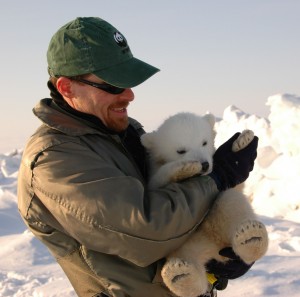This summer, WWF is helping support two expeditions that will take on some of the world’s most difficult waters, to see first-hand the effects of Arctic climate change. One expedition is sailing across the top of Russia, a journey of 6000 nautical miles through the Northeast Passage, while another is attempting a west to east transit of the Northwest Passage, also by sailing boat, a journey of about 7,000 nautical miles.
Tom Arnbom of Sweden was on the ‘Explorer of Sweden’ though the Northeast Passage, as was WWF Arctic Programme Director Neil Hamilton for much of the trip, replaced near the end by WWF polar bear coordinator Geoff York. On the ‘Silent Sound’ Cameron Dueck of the Open Passage Expedition is filing regular stories from the Northwest passage. Come back for photos and stories throughout the summer, and follow the progress of the boats as they follow in the wake of some of history’s most intrepid explorers.
By Geoff York

WWF senior programme officer for polar bear conservation, Geoff York, with a polar bear cub
So begins my small part in the 2009 expedition to successfully sail through the Northeast Passage, retracing the route of the famous explorer Nordenskiöld. I am replacing Neil Hamilton, director of the WWF Arctic Programme, and plan to go on with this blog as the journey continues across the Laptev, Chukchi, and Bering seas!
I am the senior programme officer for polar bear conservation at WWF, and a long time Alaskan. My entries will often reflect back on matters relating to arctic wildlife and the people who rely on this resource for their livelihood and culture. This is my background, the lens from which I view this amazing part of the world we call the Arctic.
As I depart Moscow for Yakutsk, I am anxious to be in Tiksi. The boat has waited an extra day for my arrival as I was delayed by paperwork and the crew a bit ahead of schedule. I know they will be ready to keep moving east as the summer quickly draws to a close in the far North. It will take nearly nine hours of flight to reach Tiksi by tomorrow evening, and I will begin this adventure with a good dose of jetlag.
Even though temperatures are beginning to cool, the sea ice will continue to melt through mid September, and it is melting fast. From 2005-2008, temperatures in the central Arctic were 5 C above the level expected. The summer sea ice extent has decreased by 40 percent since the 70s, forcing walrus to abandon prime feeding areas and leaving polar bears to choose between a summer on the distant ice or on land, neither of which is their preferred habitat (more on that later). Significant permafrost, ice sheet, and glacial melting have also already taken place. These changes are driven by greenhouse gas emissions – a byproduct of our modern lives.
Due to the reductions in sea ice extent driven by climate change, it is now possible to challenge the Northeast Passage by small sailboat without the support of an icebreaker. This is perhaps one of the last times such an expedition will be a real challenge. In the future, the melting ice will make sailing through the Passage easier and easier, and not just for small boats. Decreasing sea ice extent and thinning of the ice will open up the Arctic for unprecedented increases in transport, tourism and resource development in this vulnerable region.
As I race to meet the crew in Tiksi, I know we are all also in a race for the survival of our planet as we now know it today. In a few short months, the nations of the world will come together in Copenhagen to negotiate a new deal on climate change. This will be a crucial first step of many needed to ensure we collectively and quickly reduce our green house gas emissions, aggressively develop renewable sources of energy, and challenge ourselves to live sustainably in all aspects of our lives. Much like our sailing expedition, this will require careful planning and there will be many uncertainties along the way. Stabilising the global climate will require extraordinary commitment by all of us and it will not be easy.
I hope you will join me on both adventures starting today.
